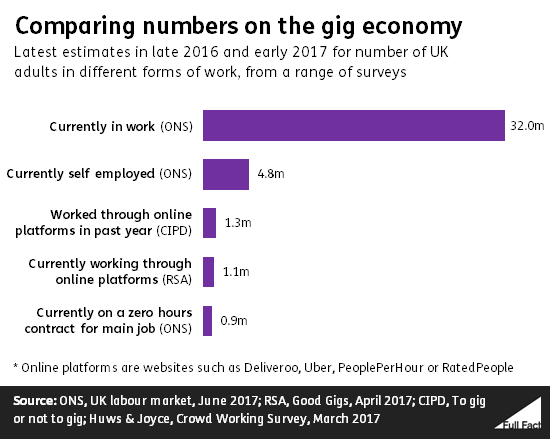'Cash-in-hand' window cleaners and gardeners told to pay 'appropriate tax'

The much-awaited Taylor Review into the UK’s gig economy is calling for the end of “cash-in-hand” payments to “casual self-employed workers” such as window cleaners and decorators.
Cash jobs were worth up to £6 billion a year – much of it untaxed, the report’s author, former political strategist and chief exec of the Royal Society of Arts Matthew Taylor, said. He is set to call for cash jobs to be paid through platforms such as credit cards, contactless payments and PayPal.
“Most of those who hire casual self-employed people, for example, as gardeners, window cleaners or child-minders, want those workers to be paying the appropriate tax,” the report said.
MORE: Ditch ‘second class citizen’ plan or face veto on Brexit deal, Theresa May warned
MORE: Dublin and Frankfurt are the main beneficiaries of Brexit so far
“However, it is hard to be sure that they are and so many people inadvertently participate in the informal economy, something that is bad for tax payers in general and unfair to the vast majority of self-employed people who pay their dues.
“Moving over time to cashless Government-accredited platforms for the payment of self-employed labour would shift the default significantly, meaning only those who intended to would participate in the informal economy. Fully implementing this move could reap several billions in additional revenues.”
Taylor also stopped short of calling for a ban on zero-hours contracts.
Speaking at the launch of the review, Prime Minister Theresa May said that banning zero hours contracts altogether “would harm more people than it would help”, but noted that it was “important” employers did not use these contracts to exploit workers.
No wonder the review has “failed to deliver” | #TaylorReview member was early Deliveroo backer https://t.co/83mUDRofr6 via @FT
— Unite the union (@unitetheunion) July 11, 2017
“Much of our success is built on the fact that we are an open, innovative economy, and we must remain that way,” she said.
“Its [Britain’s] flexibility and responsiveness, alongside clear and consistent protections for employees and workers, are all sources of strength, and in responding to changes in the labour market, we must do nothing which weakens them.
“But as the report also highlights – that flexibility cannot be one-sided, with workers shouldering the requirement to be available for work at very short notice, without any guarantee that work will actually be available or that they will be rewarded for their flexibility.”
Union leaders have lined up to criticise the Taylor Review into Britain’s booming gig economy saying it is a “missed opportunity” and “all dog and no bite”.
MORE: How craft beer brewers are strengthening their independent status
People on social media were quick to highlight how the government should be going after tax avoiders in the corporate sector rather than the ‘little guy’.
TUC general secretary Frances O’Grady said: “I worry that many gig economy employers will be breathing a sigh of relief this morning. From what we’ve seen, this review is not the game-changer needed to end insecurity and exploitation at work.
“It doesn’t look like the report’s recommendations will shift the balance of power in the modern workplace.
MORE: 11 of the worst companies to work for in the UK – as rated by their employees
“There’s nothing on concrete plans to ban the zero hours contract abuse that is growing so quickly in UK workplaces.”
Taylor’s report recommends a new category of worker called a ‘dependent contractor’, who should be given extra protections by firms such as Uber and Deliveroo.
It also says low-paid workers should not be “stuck” at the minimum living wage or face insecurity.
O’Grady said: “We’re particularly concerned these proposals might even weaken gig workers’ rights. Introducing a new category of ‘dependent contractor’ looks like caving in to special pleading from app-based companies, who are claiming that they cannot pay the minimum wage like any other employer.”

Unite leader Len McCluskey said the recommendations must be matched by effective enforcement of the law.
“Without fully resourced enforcement then all we have from Mr Taylor and the Government is a dog that is all bark and no bite,” he said.
Taylor, a one-time adviser to former Labour prime minister Tony Blair, told BBC Radio 5 Live that his aim was not to change the working landscape for those who wanted to work flexibly: “If people want to clock on and earn a few extra quid we don’t want to stop that.
MORE: Amazon primed for Macy’s? Whole Foods is just the start for Bezos’s empire
“We don’t want to ban zero hours [contracts] – many people who work zero hours want to do so.”
But he said working platform providers such as Uber had to demonstrate that workers signing on for hours of work would “easily clear” the minimum wage.
But he faced more criticism as it emerged that Greg Marsh, one of the key contributors to the review, was an early investor in Deliveroo.
‘What we’ve seen so far is tinkering around the edges and creating more loopholes employers will inevitably exploit’
Marsh said he bought shares “worth less than £10,000” when the food delivery company raised £2.75m in 2014 – shares that he has now disposed of, but not before joining the review process.
Labour’s shadow business secretary Rebecca Long-Bailey said the review did not go far enough for the 4.5 million people in insecure work.
She told the BBC’s Today programme: “If it looks like a job or it smells like a job then it is a job, and the worker should be employed, and I think in those those situations where a worker is carrying out work on behalf of an employer… they should not be exploited as a flexible workers.”

Tim Roache, GMB general secretary, said: “What we’ve seen so far is tinkering around the edges and creating more loopholes employers will inevitably exploit.
“Current employment laws and our tax and national insurance structures are sufficient – the issue has been one of enforcement, or lack of it.
“Unscrupulous employers are ignoring the rights which workers already have and are not paying their fair share of taxes.”
MORE: Government ‘struggling’ to balance Brexit trade negotiations
Mark Littlewood, director general at the Institute of Economic Affairs, said the review would do little to address in-work poverty and could see consumers end up paying more for taxi rides and home food deliveries.
“Rather than playing this economically costly and ultimately futile game of cat and mouse, politicians should use the emerging gig economy as an opportunity to liberalise labour law,” he said.

 Yahoo Finance
Yahoo Finance 
